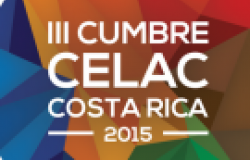The American South’s Growing Self-Assurance. The CELAC Summit of 2015 and the Perspectives

Roland Benedikter and Georg Göschl report on the confidence on display at the third summit of the Community of Latin American and Caribbean States.
On 28th January 2015, Heads of State and Government from the Caribbean and Latin America met in Costa Rica at the third summit of the Community of Latin American and Caribbean States (Comunidad de Estados Latinoamericanos y Caribeños, CELAC). Their aim was to promote the reduction of poverty alongside greater social integration. An action plan to combat poverty and hunger in the region was presented.
Cuba’s relationship to the USA warranted particular attention at the summit. The Cuban President, Raúl Castro, was encouraged to negotiate further by the CELAC Heads of State and Government. The four most important outcomes of the summit were:
- The CELAC states committed to eliminating famine in affected regions by 2025. From over 550 million people who make up the Caribbean–Latin American community today, around 68 million live in poverty. The Community declared that this did not result from a lack of resources, rather their unjust distribution. The summit hence took up a theme that, in the opinion of many analysts, will be the defining problem of the century.
- The Caribbean and Latin America demanded an end to external “interference” in the affairs of CELAC countries. CELAC was founded in opposition to US-dominated organizations such as the Organization of American States (OAS), and rejected US sanctions imposed on Venezuela on 18th December following the violent suppression of protests. These sanctions allow US President Obama to refuse visas and to freeze the accounts of Venezuelan representatives who were involved in the suppression of anti-government protests. This was a violation of civic rights and a danger to peace in the region, according to the Community’s declaration, which was adopted at the request of Venezuela’s authoritarian left-wing President Maduro.
- The Heads of State and Government proposed the inclusion of Puerto Rico in the next CELAC summit. In a provocative gesture, which the state media of the participating countries interpreted as a sign of the South’s growing self-assurance, the Community called for the “complete independence” of the former US colony Puerto Rico, which since 1952 has had the formal status of an “associated state.”
- CELAC ordered US President Barack Obama to lift all US sanctions against Cuba completely and without delay. Cuba’s President, Raúl Castro, who enjoyed particular attention from the international media, reaffirmed Havana’s wish to normalize relations with Washington, yet also indicated that the continued sanctions against his country had not only led to humanitarian and economic damage, but also contravened international law. For genuine, rapid progress in diplomatic relations with the USA, according to Castro, a complete suspension of all sanctions would be necessary. The question nonetheless remains as to whether it was a smart move on Castro’s part to stipulate conditions during a period of thaw originating in the USA.
All in all, the consolidation of the CELAC alliance, visible at the summit, represents a strengthening of the Latin American–Caribbean region, both rhetorically and in its demands. This is accompanied by its development as an increasingly independent economic region, driving the differentiation of the geopolitical power structure away from the USA, the European Union, China, other BRICS “threshold states” such as Russia, and the “next eleven” states with elevated economic and demographic potential, such as Mexico and South Korea. The CELAC alliance has so far seen its common features in primarily cultural characteristics such as language, culture and history. Yet it has the potential to develop into a fifth economic power, rivalling the USA (recovering from years of war and crisis, but increasingly polarized in domestic politics), China (not only inspired, but practically intoxicated by an economic, demographic and power-political boom), the BRICS states (mired in social, ethnic and political crises) and the European Union (supporting balance and diplomacy, but still incoherent in its foreign policy owing to domestic crises).
The CELAC summit of January 2015 can, from this perspective, be seen as the foundation stone of increasing multipolarity, even if its participants’ hopes for greater significance and attention will not be realized as soon as they would like. Although a rapid reduction of US-American influence, owing to decades of tightening interconnections within the South American and Caribbean region, remains unlikely, a closer approach of this region to its northern partner and her allies is a concrete possibility. One contributing factor is Barack Obama’s concern to secure his place in history, for which he will have to improve the Democratic Party’s chances in the 2016 presidential election. He could do this by protecting illegal immigrants from the South, as well as normalizing relations with Cuba, both of which would target the votes of “Latino” immigrants who, although often poor and failing to master English, paradoxically vote Republican, as many of them are strongly religious. This constellation calls for a further period of thaw on the US side until the 2016 presidential election.
On the other hand, the CELAC countries must prioritize finding a balance with the USA and her allies during this present phase of development, despite their historically shaped aversion, radical-left politicians, authoritarian governments and continued domestic difficulties. Low oil prices play a role here, which are currently causing problems for anti-American CELAC members such as Venezuela or Bolivia, as well as the falling approval rates for governments such as Maduro’s, which during the summit sat at 22%. It is to be expected that CELAC – apart from isolated cases of confrontational rhetorical and bilateral hardship – will conduct cautious and moderate politics with the USA in coming years and will strive for rapprochement and just cooperation whilst emphasizing autonomy.
The overall constellation allowing an improvement in relations between South and North America is more favourable than in previous years. But what about Europe?
Even if, at the 2013 EU–CELAC joint summit in Santiago, the European–Latin American–Caribbean partnership was hailed as pioneering for the 21st Century, this year’s CELAC summit was underrepresented in the European media and, by contrast to EU summits in the Latin American media, scarcely perceived. The EU appears too preoccupied with its internal tensions, as shown at present in its precarious relationship with the strengthened Greek Left. In foreign policy, the EU is challenged with agreeing on a coherent line and consistently representing this in its foreign relations. This also applies to the important relationship, expected to grow, with CELAC, which in turn affects and must take into consideration the US–EU relationship, hardly making things easier. Nonetheless, so long as the EU is primarily occupied with itself – with its domestic political tensions on the one hand, and its arduous attempts at finding a foreign policy position on the other – bilateral relationships, including those to the CELAC region, will only be given secondary attention in day-to-day European politics.


